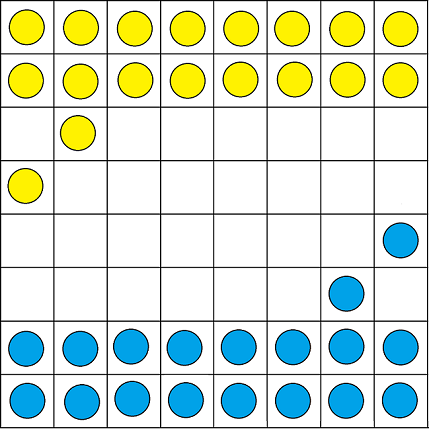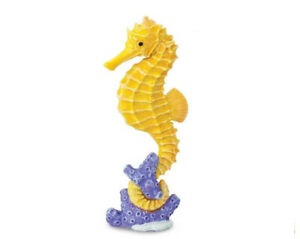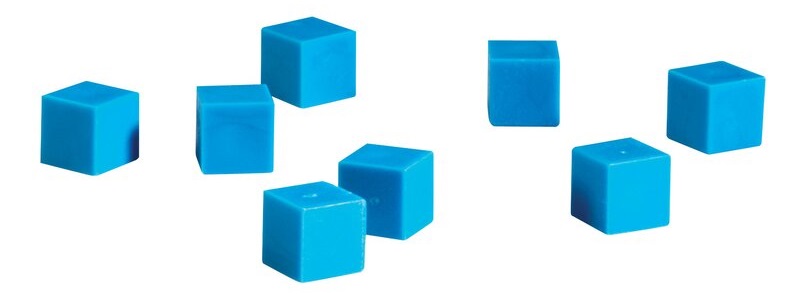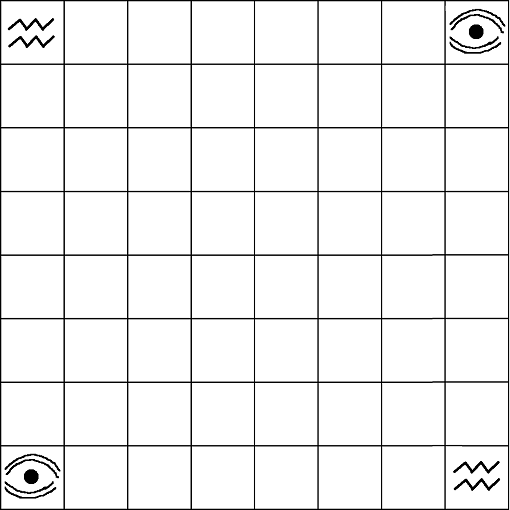
Cubes in the front row, two seahorses in the corners and two ahead, with six classic chess at the back.
Or instead of seahorses in the corner they could replace the two royal chess pieces. Closer to familiar real chess.
There is a new game idea evolving, called Atlantis Chess.

Cubes in the front row, two seahorses in the corners and two ahead, with six classic chess at the back.
Or instead of seahorses in the corner they could replace the two royal chess pieces. Closer to familiar real chess.
The principle here, before we get lost in the details, is you have a chess type situation, but with a number of completely different things going on.
Assuming you are blue, if you go to the far left square, you win the game. If you go to the far right, you get vision.
cubes -> classic chess -> seahorses -> cubes
For each side there are
Eight cubes. Cubes can capture chess pieces and cubes.
Six classic chess pieces. Chess pieces can capture seahorses and chess pieces.
Four seahorses. Seahorses can capture cubes and seahorses.
The classic chess pieces are rook, bishop and knight.
When you want to move a seahorse, you roll four one/zero dice and move a
seahorse orthogonally that amount, 0-4. You have some control.
It's random, but some numbers are more
likely than others. You can choose the piece after rolling the dice,
you choose the direction, and you can choose not
to move.
Cubes move orthogonally, like rooks.
There are either dots or rings
on the sides facing
the player, not visible to the opponent. One player is SAME, while the other is DIFFERENT.
If one secret piece attacks another, the SAME player wins if the symbols on the pieces are the same,
while the DIFFERENT player wins this confrontation if the symbols are different. So there is a
luck/memory/deduction/bluff experience.
When a cube is in any way involved in an attack, the symbol must be shown, temporarily.
When an opposing player lands on your vision square, the symbols on all the friendly cubes
are revealed, until there is no longer an opponent's piece on the vision square.


I anticipate one issue. Half the pieces are secret, and there is a memory aspect to this. That means people will have to focus relentlessly, which could be annoying.
"They say this was the game the people of Atlantis played." Hmm.. This could borrow some aesthetics from The Royal Game of Ur, thousands of years old, and could subtly evoke the antediluvian Atlantis civilisation.
I do like the blue and yellow colours. Cubes are short and squat,
seahorses are tall and thin, while chess pieces are somewhere in between.
Should there be easy-to-use six-sided dice, or traditional, exotic pyramid dice? I say pyramid.
The board is just white, with blue or black lines.
One option is to give it a tiled look, mostly or even entirely white.
The vision square has an eye image, from thousands of
years ago, while the target square has the angled double wave symbol that is Aquarius in
astrology.
There are alternate setups for this untested game.
I tested Atlantis Chess. Surprisingly, the rules work out just fine (the setup had two seahorses out front, and a traditional
chess layout with two more seahorses replacing the king and queen).
My dad and I both liked it.
The game is a complex and confusing mess. What should you focus on?
While the goal of traditional chess is to chase down a king, this game involves the four corners. You can have perilously dangerous
situations around more than one corner at the same time. Did you notice the bishop way over there?
Luck is a factor. You roll the dice to see if moving that seahorse will keep you from losing the game.
You can send a cube across the board in a coup de main to clean out a corner and win the game,
but without data you have a 50/50 chance of winning a fight with a
defending cube. Cubes were thought of as involving memory and perhaps deduction, but the cubes are typically a matter of calculated risk (e.g. can
the opponent send another piece in a counterattack?), and don't forget
seahorses can clobber cubes.
Before testing it I said we will look for catch up mechanisms, and this could indicate if the game is good. At least half the time this game is played, it ends with a knife edge situation, where either player could take the risk and take a corner. That's great!
All pieces are valuable. Rooks and knights are the least valuable (stuck
in the back?). Bishops are like snipers, often taking a corner from a
distance, and certainly seahorses don't like them.
Seahorses are like clumsy cave trolls, quite capable of whacking
an opponent's cube without exposing data. They can also be
obstructing pillars. But in the end it's really the cubes that will win the game for you.

Here is an example of a game. Not perfect, incomplete.
neutral perspective
blue's perspective
yellow's perspective
Blue is SAME. Yellow is DIFFERENT.
I have a high opinion of this game. I think it's a mic drop moment.
NEW example game with new physical game FIXED LINK